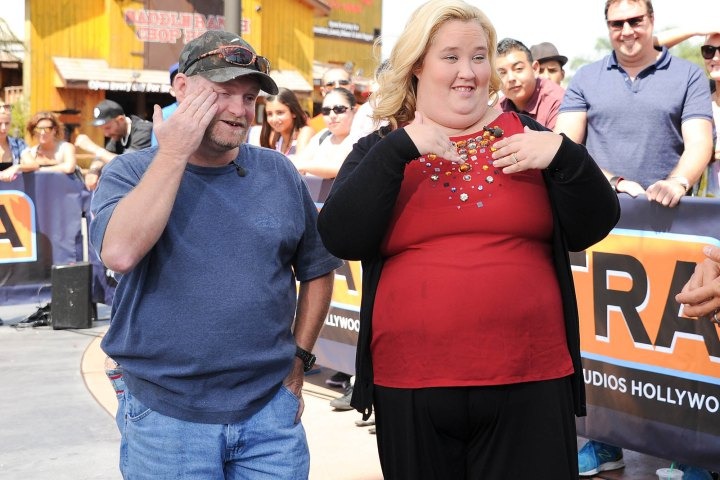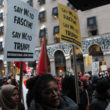June Shannon, better known as Mama June and mother of Alana “Honey Boo Boo” Thompson, knows exactly how much everything costs. Couponing is a “serious obsession” and “like crack.” One episode shows Shannon pitching 14 Nesquick packets into her shopping cart in the Piggly-Wiggly, then doing some “quick math” on a mustard—89 cents per jar. She’s not lacking in savvy—she’s relentlessly frugal, even accounting for the cost of gas and detergent when her children play in the mud. This is a woman who manages to feed a family of six on $80 a week, or roughly 63 cents per meal.
Contrast that with the audience for whom Mama June, Alana, and the rest of the clan are performing. Forty-five percent of TLC’s audience has attended college, and earn a median income of more than $61,000 per year. More than 70 percent of TLC’s viewers own a house. Visitors to TLC’s website are less likely than the national average to have children in the household; a higher portion have attended graduate school. These people aren’t watching Honey Boo Boo because they identify with her or her culture: it’s pure class voyeurism, a way of tokenizing poverty—of making it something that happens to someone else.
Increasingly, poverty is not something that happens to someone else, and it is not confined to those who shop at Piggly-Wiggly and Safeway and live in the rural South or the inner city.
Increasingly, poverty is not something that happens to someone else, and it is not confined to those who shop at Piggly-Wiggly and Safeway and live in the rural South or the inner city. According to a report by the Brookings Institute, enrollments to the Supplemental Nutrition Assistance Program (food stamps) have risen at a rate of 73 percent in the suburbs—compared to 61 percent in the inner city. The most recent student loan default rate is nearly 15 percent. But most universities, public and private, require student loans as part of the student self-help component when packaging even low-income students with aid. Increasingly, poverty happens to the seemingly middle class—people with advanced degrees and homes in the suburbs.
It’s in this climate that a new book asks When Did White Trash Become the New Normal? Written by a former gossip columnist and senior editor for the Independent Women’s Forum, Charlotte Hays, the book places the blame for the shrinking middle on what remains of it, as well as share a few recipes, family anecdotes, and half-baked diatribes about personal responsibility in there—sort of like a dithering aunt or nosy neighbor, but more judge-y.
Hays trains her catty eye on the habits of the lower class, which she sees as spreading across the social classes like a bad tan. In addition to the usual “kids these days” offenses like piercings, plastic surgery, and tattoos (for which she reserves a peculiar ire), Hays outlines new ways to be tacky, like bouncing a check, defaulting on one’s student loans, and being underwater on one’s mortgage. In Hays’ world, financial hardships are just as much the decision of the individual as a facelift or collagen injections.
Indeed, Hays says she can’t find any greater evidence of the “White Trashing of America” than student loans. She also confesses that she hates her middle name, shared with her great-uncle, then lets slip that said uncle financed her education. But having a cumbersome family name is not nearly so tacky as to have defaulted “on a guvmint loan,” seemingly failing to realize America is filled with over-leveraged Millennials who would have loved to have such a misfortune, and failing that, were stuck taking out a government loan.
At her most lucid, she comes across as a deranged, tone-deaf hybrid of Old Economy Steve and Emily Post. She’s oblivious to her privilege as a white, self-proclaimed “Southern gentlewoman” to the point of being inane: “When it comes to dealing with computer people or telemarketers, I inevitably feel like Alex Haley’s character Kunta Kinte.” Simultaneously humble-bragging and finger-pointing, her commentary just seems, well, gauche.
What Hays is saying is really nothing new. Thirty years ago, Paul Fussell called it “prole drift.” But this sort of cultural snobbery plagues the better-off, conservative and liberal alike, by alienating a rapidly-expanding underclass, and ignoring (perhaps willfully) their own precarious status. It’s an elitism that assumes we’re better than them—by virtue of zip code, education level, balanced checkbook, tasteful wardrobe. Hays is mired in the same virulent strain of American exceptionalism that threatens to destroy conservatives from within: that hard work and sacrifice are sufficient qualities for success—not just necessary ones for survival.
And this is the great myth of the Tea Party, of the Republican Party, of America: it is that opportunities exist, and if one is not prospering in this land of endless Jell-O, it is one’s own fault. It is a myth that is oblivious to stagnant wages, rapidly inflating costs of living, and barriers to education. It is a myth that is wildly classist and elitist, and one in which debt and poverty are the shame of an individual and not a nation. Neither Hays nor TLC’s audience should feel superior: thrift and taste aren’t enough to protect from the shrinking middle, any more than a master’s degree and a Barbour jacket can save one from an earthquake.
Alexis Zanghi studies creative writing at the New School.







0 Comments